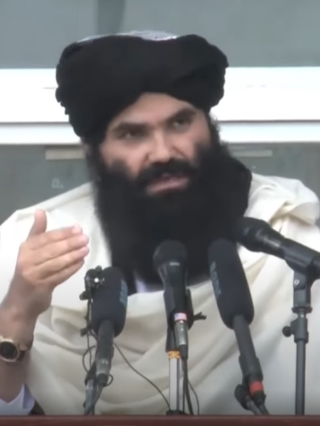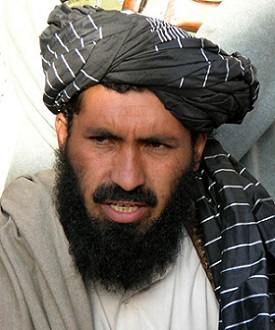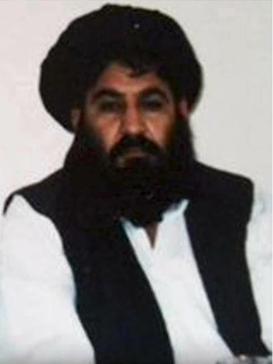Related Research Articles

Mullah Muhammad Omar was an Afghan mujahideen commander, revolutionary, and the cleric who founded the Taliban. During the Third Afghan Civil War, the Taliban fought the Northern Alliance and took control of most of the country, establishing the First Islamic Emirate for which Omar began to serve as Supreme Leader in 1996. Shortly after al-Qaeda carried out the September 11 attacks, the Taliban government was toppled by an American invasion of Afghanistan, prompting Omar to go into hiding. He successfully evaded capture by the American-led coalition before dying in 2013 from tuberculosis.

Mullah Abdul Salam Zaeef is an Afghan affiliated with the Taliban political / militant organization and a former Afghan ambassador to Pakistan before the US invasion of Afghanistan.
Wakil Ahmad Muttawakil Abdul Ghaffar is an Afghan politician who has been a member of the militant Taliban organization. He was the Taliban foreign minister from 27 October 1999 in their first Islamic Emirate of Afghanistan rule, until the Taliban were deposed in late 2001. Prior to this, he served as spokesman and secretary to Mullah Mohammed Omar, leader of the Taliban. After the Northern Alliance, accompanied by U.S. and British forces, ousted the regime, Muttawakil surrendered in Kandahar to government troops.

Mullah Mohammad Fazl is a member of the Taliban militant group and the First Deputy Defense Minister of the Islamic Emirate of Afghanistan, having assumed the role on 7 September 2021. He also served in the position during the previous Taliban government (1996–2001).

Abdul Haq Wasiq is the Director of Intelligence of the Islamic Emirate of Afghanistan since September 7, 2021. He was previously the Deputy Minister of Intelligence in the former Taliban government (1996–2001). He was held in extrajudicial detention in the Guantanamo Bay detainment camps, in Cuba, from 2002 to 2014. His Guantanamo Internment Serial Number was 4. American intelligence analysts estimate that he was born in 1971 in Ghazni Province, Afghanistan.

Mullah Abdul Rauf Aliza, widely identified as Mullah Abdul Rauf Khadim, was an Afghan militant who served as a senior leader in both the Taliban and ISIS-K.

The 1996–2001 Afghan Civil War, also known as the Third Afghan Civil War, took place between the Taliban's conquest of Kabul and their establishing of the Islamic Emirate of Afghanistan on 27 September 1996, and the US and UK invasion of Afghanistan on 7 October 2001: a period that was part of the Afghan Civil War that had started in 1989, and also part of the war in Afghanistan that had started in 1978.

Mohammed Abdul Kabir is a senior member of the Taliban leadership who is a militant leader and, since 4 October 2021, the acting third deputy prime minister for political affairs of Afghanistan in the internationally unrecognized Taliban regime. He previously was the acting prime minister of Afghanistan from 16 April 2001 to 13 November 2001.

Sirajuddin Haqqani is an Afghan warlord and Specially Designated Global Terrorist who is the first deputy leader of Afghanistan and the acting interior minister in the internationally unrecognized post-2021 Taliban regime. He has been a deputy leader of the Taliban since 2015, and was additionally appointed to his ministerial role after the 2021 withdrawal of foreign troops. He has led the Haqqani network, a semi-autonomous paramilitary arm of the Taliban, since inheriting it from his father in 2018, and has primarily had military responsibilities within the Taliban.

Mullah Mansoor Dadullah was the Taliban militant commander Mullah Dadullah's younger half-brother who succeeded him as a senior military commander of the Taliban in southern Afghanistan. He came from the Arghandab district of Kandahar province, and belonged to the Kakar Pashtun tribe.
The following lists events that happened during 2004 in Afghanistan.
Abdul Qayyum "Zakir", also known by the nom de guerre Abdullah Ghulam Rasoul, is a Taliban militant commander and the acting Deputy Minister of Defense of the internationally unrecognized Taliban regime currently ruling Afghanistan. He was also the acting Defense Minister of the Taliban, from 24 August 2021 to 7 September 2021.

Maulvi Nazir was a leading militant of the Pakistani Taliban in South Waziristan. Nazir's operations were based in Wana.

Abdul Ghani Baradar is an Afghan militant and religious leader who is the acting first deputy prime minister, alongside Abdul Salam Hanafi, of the internationally unrecognized post-2021 Taliban regime in Afghanistan. A co-founder of the Taliban along with Mullah Omar, he was Omar's top deputy from 2002 to 2010, and since 2019 he has been the Taliban's fourth-in-command, as the third of Leader Hibatullah Akhundzada's three deputies.
2003 in Afghanistan. A list of notable incidents in Afghanistan during 2003

Mullah Noorullah Noori is a militant and Minister of Borders and Tribal Affairs of the Islamic Emirate of Afghanistan since 7 September 2021. He was also the Taliban's Governor of Balkh Province during their first rule (1996–2001). Noori spent more than 12 years in the United States's Guantanamo Bay detention camps, in Cuba. Noori was released from the detention camp on May 31, 2014, in a prisoner exchange that involved Bowe Bergdahl and the Taliban Five, and flown to Qatar.
The following lists events that happened during 2015 in Afghanistan.

Akhtar Mohammad Mansour was the second supreme leader of the Taliban. Succeeding the founding leader, Mullah Omar, he was the supreme leader from July 2015 to May 2016, when he was killed in a US drone strike in Balochistan, Pakistan.

The Sacrifice Front, more commonly known as Fidai Mahaz, was a Taliban splinter group and faction in the War in Afghanistan. It was led by Mullah Najibullah, also known as Omar Khitab, a former Taliban commander.
References
- ↑ Former Taliban leaders renounce past to stand in Afghan elections, The Independent , September 15, 2005
- ↑ M K Bhadrakumar (May 19, 2007). "Afghan battle lines become blurred". Asia Times. Archived from the original on May 21, 2007. Retrieved 2007-11-03.
{{cite news}}: CS1 maint: unfit URL (link) - 1 2 Dimanno, Rosie. Toronto Star, Taliban turncoat's got a new mission, August 13, 2009
- ↑ Khyber.org, Mullah Abdul Salam Rocketi [usurped]
- ↑ W. Adamec, Ludwig (2012). Historical Dictionary of Afghanistan. Scarecrow Press. p. 370. ISBN 9780810878150.
- ↑ The Independent, Explosions rock eastern Afghan city of Jalalabad [ dead link ], October 15, 2001
- ↑ Cape Times, Bin Laden's men putting up a blistering fight, December 10, 2001
- ↑ The Guardian, "Taliban security chief dies in raid", January 3, 2002
- ↑ Keath, Lee. Associated Press, US Captures ex-Taliban commander [ dead link ], May 14, 2002
- ↑ Paul McGeough (July 15, 2006). "Afghanistan wakes to false dawn". Sydney Morning Herald . Retrieved 2007-11-03.
- ↑ Syed Saleem Shahzad (August 24, 2007). "Talks with the Taliban gain ground". Asia Times. Archived from the original on September 15, 2007. Retrieved 2007-11-03.
{{cite news}}: CS1 maint: unfit URL (link) - ↑ M.K. Bhadrakumar (October 6, 2007). "Staying the course in Afghanistan". The Hindu . Chennai, India. Archived from the original on October 30, 2007. Retrieved 2007-11-03.
- ↑ "Preliminary Result of Afghanistan Presidential Contest". Sabawoon online. 2009-08-20. Archived from the original on 2009-08-03.